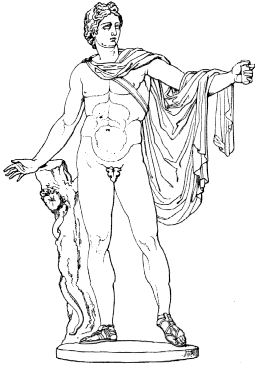
Apollo is associated principally with music, prophecy, sickness, and medicine. Like most of his fellow Olympians, Apollo did not hesitate to intervene in human affairs.
Apollo was a gifted musician who delighted the gods with his performance on the lyre. Therefore he is sometimes referred to as the god of music and songs which are heard during times when light triumphs over darkness. He was also known as a master archer and a fleet-footed athlete, credited with having been the first victor in the ancient Olympic Games. Apollo was the special protector of young men. He was also the god of agriculture and cattle and of light and truth. He taught humans the art of healing. He is associated with youth and strength. The physical aspect of Apollo is also known as Helios or Hyperion.
He was also a god of light, known as "Phoebus" (radiant or beaming, and he was sometimes identified with Helios the sun god). He was also the god of plague and was worshiped as Smintheus (from sminthos, rat) and as Parnopius (from parnops, grasshopper) and was known as the destroyer of rats and locust, and according to Homer's Iliad, Apollo shot arrows of plague into the Greek camp. Apollo being the god of religious healing would give those guilty of murder and other immoral deeds a ritual purification. Sacred to Apollo are the swan (one legend says that Apollo flew on the back of a swan to the land of the Hyperboreans, he would spend the winter months among them), the wolf and the dolphin.
Apollo, in Greek mythology, son of the god Zeus and Leto, daughter of a Titan. He also bore the epithets "Delian" from Delos, the island of his birth, and "Pythian," from his killing of the Python, the fabled serpent that guarded a shrine on the slopes of Mount Parnassus. In Homeric legend Apollo was primarily a god of prophecy. His most important oracle was at Delphi, the site of his victory over the Python. He sometimes gave the gift of prophecy to mortals whom he loved, such as the Trojan princess Cassandra.
He was eternally youthful and was originally distinguished by his amorous adventures (not all were successful), his quick temper, his pride, and his harsh violent reactions (he flayed alive a musical competitor). But after Apollo had killed the Cyclopes and was punished by Zeus by having to tend sheep for a year, he learned his lesson. Thereafter he counseled moderation and self knowledge.
Know Yourself and Nothing to Excess were emblazoned on his temple at Delphi. He even brought the muses down from their home on Mt. Helicon to Delphi, tamed their wild frenzy, and taught them formal and decorous dances.
Apollo became a Panhellenic god, second only to Zeus. He embodies the Greek spirit; because almost everything which distinguishes the Greek outlook on life from that of other peoples around them--sensitivity in art, poetry, music, youthful good health, respect for law, and love of orderliness and moderation--all these civilizing concepts are symbolized by Apollo. Even today the term Apollonian means harmonious, measured, ordered, and balanced in character.
Apollo is represented as the ideal form of male physical beauty. Perhaps because of his beauty, Apollo was represented in ancient art more frequently than any other deity. As the ideals are altered by time, so do the appearances of Apollo. But normally he is represented as a young man, beardless, and delicately framed. As a musician he sometimes wears a tunic. His attributes include: bow, arrow and quiver; the lyre--as patron of music, laurel leaf crown, for his achievements in the arts, and a chariot for his association with the sun god Helios.
Apollo was worshiped throughout the Greek world, at Delphi every four years they held the Pythian Games in his honor. He had many epithets, including "Pythian Apollo" (his name at Delphi), "Apollo Apotropaeus" (Apollo who averts evil), and "Apollo Nymphegetes" (Apollo who looks after the Nymphs). As the god of shepherds he also had the cult titles "Lukeios" (from lykos; wolf), protecting the flocks from wolfs, and "Nomius" (of pastures, belonging to shepherds). Being the god of colonists, Apollo influenced his priests at Delphi to give divine guidance, as to where the expedition should proceed. This was during the height of the colonizing era circa 750-550 BCE. Apollo's title was "Archigetes" (leader of colonists). According to one legend, it was Apollo who helped either Cretan or Arcadian colonists found the city of Troy.
Apollo is in many respects the paradigm of a Greek god. He represents order, harmony, and civilization in a way that most other Olympian deities cannot quite equal. One only has to compare him with Dionysos to understand how Apollo is depicted as a bright, rational counterpart to the chaotic and frenzied god of wine and women.;



